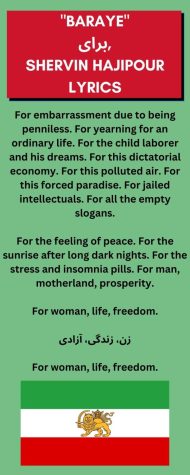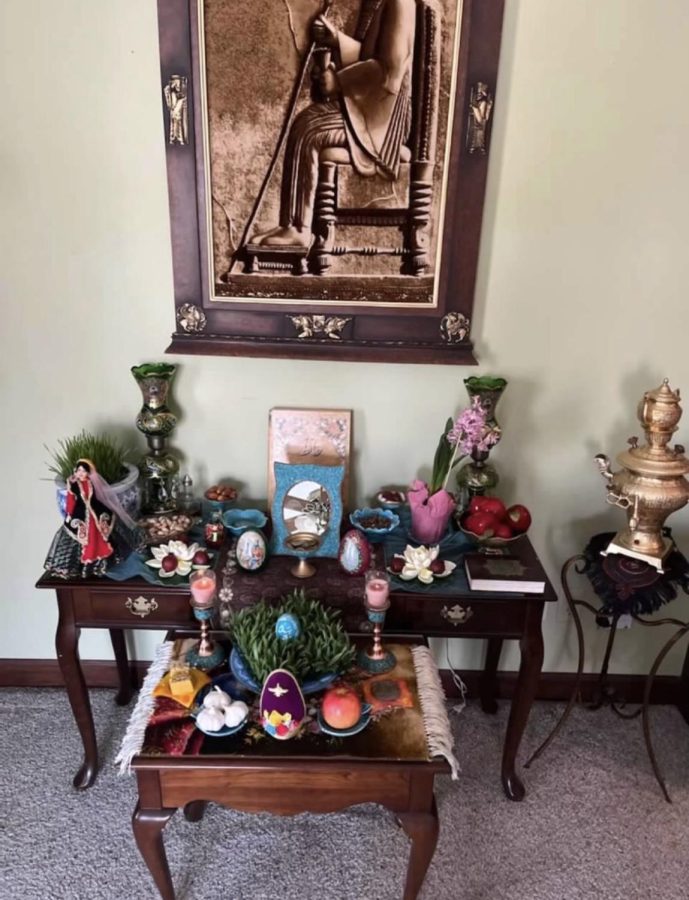Upon releasing the nominations for the 65th annual GRAMMY Awards, the Recording Academy introduced a new award: Best Song For Social Change. This award was established to recognize songs that address timely social issues and promote understanding, peacebuilding and empathy. Determined by a Blue Ribbon Committee and ratified by the Recording Academy Board of Trustees, “Baraye” by Iranian singer-songwriter Shervin Hajipour won the award.
Set to a sorrowful piano melody, “Baraye”—translating to ‘because of’ in Farsi—was posted on Hajipour’s Instagram account on Sept. 28, quickly becoming Iran’s unofficial protest anthem following the death of Mahsa Amini. Hajipour wrote the lyrics using tweets from Iranians explaining their reasons for joining the nationwide protests: unjust laws, violations of women’s rights, brutality against protestors and impositions of Islamic law.
“For dancing in the streets,” the lyrics translate to. “For our fear when kissing loved ones. For my sister, your sister, our sisters. For the changing of rotted minds. For the girl who wished she was born a boy.” The song ends with the recognizable chant that has become synonymous with the protests: “jin-jiyan-azadi”—“For women, life, freedom.”
When junior Somia Suleiman first listened to “Baraye”, she was both astounded and saddened by the lyrics. “It’s awful that in today’s society, women are still having to fight for their rights. Men and women are both made the same,” she said. “We all come into this world the same, yet we are not equals. I pray for the people of Iran every night. I pray that one day I wake up and it’s all just a sick dream. Because what is happening in Iran is so inhumane; it is truly unbelievable.”
Hajipour’s post garnered 40 million views in two days, spreading like wildfire to Iranians and the Persian diaspora.
After winning the award, Hajipour took to Instagram to comment on the Grammys; however, as many commenters noted, his words were manipulated by the Iranian government. Once translated from Farsi to English, the post read, “I must say that a large part of the life and happiness of the people of Iran and the region has been destroyed by a government that the wife of the president of that country gave me this award.” Hajipour is referring to First Lady Jill Biden who presented the award at the ceremony. “I love my dear country with all its beauty and I will stay here,” the post concluded.
This post came after Hajipour was arrested on the charges of creating propaganda against the system and inciting people to commit violent acts. Though he has since been released, Hajipour was unable to attend the Grammys ceremony as he is awaiting a trial that could result in a six year prison sentence and being banned from leaving Iran.
Though Hajipour was promptly arrested, it was too late to stop the song’s impact. Iranians of all demographics continue to play and use “Baraye,” despite the government’s harsh retaliation.
An anti-hijab campaign features Iranian schoolgirls with “Baraye” as the driving force while protestors chant the lyrics in the streets. A popular video features high school girls standing without hijabs as they hold hands and sing “Baraye.”
Sophomore Ayah Alsheika, whose family is from Syria, is amazed by the influence of “Baraye” and how it has connected Iranians. “It’s uplifting to see how a song can have so much power in uniting a nation,” she said. “I think it speaks volumes to how unity is so important in the face of adversity.”
Outside of Iran, the Persian diaspora has promoted “Baraye” to raise awareness about the Iranian citizens’ plights. Iranian-Swedish pop singer Arash Labbaf played “Baraye” during his packed Canada concert. Coldplay invited exiled Iranian actress Golshifteh Farahani to their show in Buenos Aires to perform “Baraye.” Jon Batiste covered the song and designer Jean Paul used the song as the soundtrack for his show at Paris Fashion Week. Malala Yousafzai, a Nobel Peace Prize winner, played “Baraye” in the background of a video message to the people of Iran.
The lyrics have been translated in numerous languages and performed in various genres: jazz and opera in English, metal in Germany and a choral arrangement by French school children. It inspired dance performances in Israel and some artists have performed the song in its original Farsi, including a Ukrainian artist.

To add on to the song’s international importance, “Baraye” received another layer of well-deserved recognition at the Grammys. According to the Recording Academy, the song received more than 95,000 submissions in the Special Merit category. The Recording Academy said it was “deeply moved” by the overwhelming number of submissions for “Baraye.”
Nahid Siamdoust, author of “Soundtrack of the Revolution: The Politics of Music in Iran”’ and assistant professor of media and Middle East studies at the University of Texas at Austin, believes that no song has impacted the revolution as much as Hajipour’s has. “‘Baraye’ winning a Grammy sends the message to Iranians that the world has heard them and is acknowledging their freedom struggle,” she said. “It is awarding their protest anthem with the highest musical honor. Music can travel and traverse homes and communities and spread sentiment in a way that few other means can achieve.”
When presenting the award, the First Lady described the song as a “powerful and poetic call for freedom and women’s rights.” As Hajipour’s image was reflected on the stage behind her and “Baraye” played for the audience, she reiterated Iran’s uprising slogan: “For Women, Life, Freedom.”
“For Women, Life, Freedom” is the same message that Iranians have been shouting since September. Whether it be at protests, concerts, campuses, high schools or funerals, Iranians have been fighting nonstop for their freedom. This Grammy win shines a brighter spotlight on “Baraye” and Iran’s protests.
Hajipour’s win was celebrated by Iranians internationally via Instagram, Twitter, TikTok and other social media platforms, all of whom rejoiced in the recognition for a song that addresses the grievances of Iranians who long for peace and freedom.
As the Iranian protests continue to gain global recognition and support, the wins that the Iranian citizens gain from works like Hajipour’s add fire to the fight that is long dying out.









